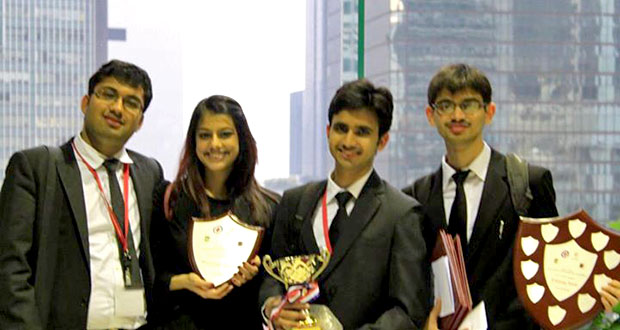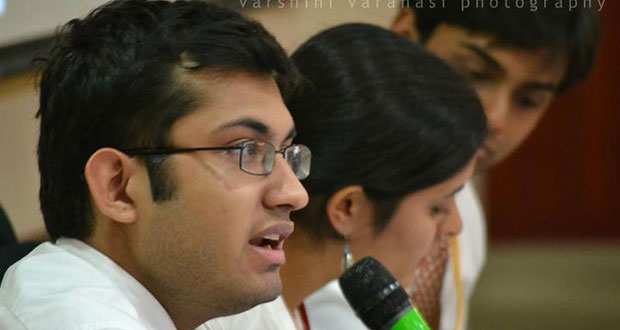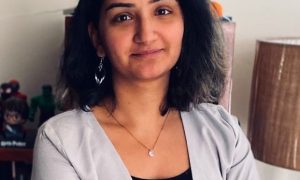Naman Joshi graduated from NLU, Delhi in 2014. He is currently an associate at an illustrious litigation firm, Karanjawala & Co. He has been quite involved in Debating and Mooting as a student, and coached the NLU Delhi Team which went on to win the 12th Henry Dunant.
His engagement in sport, community service, and extra-curricular activity has also been recognised by the H. R. H. Duke of Edinburgh, Prince Philip.
We asked him about:
- Being the Best Debater at Outlook SpeakOut North Rounds
- Coaching the NLU Delhi team to success at 12th Henry Dunant
- Receiving the Gold Standard of the International Award for Young People
How would you like to introduce yourself to our readers?
I am a lawyer who in my free time, likes to read, watch reruns of Friends and Two and a Half Men, and play FIFA.
I do have lawyers in my family. My mother is one, but she did law late as an afterthought and partly out of boredom. She was working earlier as a consultant and decided she needed something new to do. Apart from that on my paternal side I have two lawyers.
What brought you into legal studies?
I did not consider engineering as a career. It never appealed to me. Medicine on the other hand did sound fascinating, especially because I read up a substantial amount about the human body when my father underwent a bypass.I was in 6th Class then and being a surgeon sounded nice. But to be very honest, I neither had the math skills nor the scientific acumen to pursue it at the highest level. It’s not just about being a doctor or an engineer. It’s about being good enough to rise to the top of your game. Law was a conscious choice from quite early on. I’d say about 9th Class onwards. When it came to second language options, I chose Hindi instead of French (lot of lower court proceedings are in Hindi). When it came to choosing subjects in 11th, chose History, Political Science, Economics, and Maths (these subjects barring maths, are taught in law school and are actually helpful when practicing law). Law also gelled with the other things I was doing in school – debating, writing, hosting a TV show on DD Bharti, community service etc.
What would be your advice to someone who has never debated earlier?
(Naman has been awarded the Best Debater spot the Outlook SpeakOut Debate.)
Honestly, I can think of at least three debaters better than me in my own class from college itself. In fact, I have never even won a debating tournament since I have stepped into college.
Partly, because the Parliamentary Debate format didn’t feel as comfortable as Oxford-Style did and partly, because I didn’t work on it because I was mooting extensively. So no advice as far as acing a debating tournament is concerned. As far as someone who has never debated earlier is concerned, my only advice would be, give it a shot. What’s the worst that could happen? It is a fun activity where you get to travel along with a couple of your college mates and the downside is missing college for three days or so and the upside is winning some serious cash!
What separates a good mooter from an average mooter?
(Naman has represented India at the 53rd and 54th Philip C. Jessup International Law Moot Court Competition. You have been also been ranked the 30th Best Oralist at the 54th Jessup.)
A good mooter is one who masters not only the brief he or she has prepared but also everything around it and is ready to have a conversation with the judges. An average mooter prepares a brief and goes ahead and argues it. The former understands the context in which the arguments are placed. The reason they are being made at all. The latter looks at the last page, sees the questions of law and opens up a book to cite authorities.
Mooting is not just an activity you should participate in because it is a check box in your ‘things to do in law school’ book. Do it because you like the activity. Do it because you want to read, write, and talk about a particular thing. For me that happened with international law. Even though I am not mooting anymore and my work is far divorced from international law, I like to stay in touch with the subject because I like it.
What would you say contributed to the huge success of the team that you coached for the 12th Henry Dunant rounds?
I think what contributed to the huge success of the team that I coached was the very hard work they all put in. Dhruv, Utkarsh, and Natasha were absolutely dedicated to the cause of winning and they did everything they had to, to do so. Including roping me in as coach, which can be a decision one can later regret (I am sure they all did at some point or the other) because I can be very unpleasant to work with. I expect people to function in a particular way, am extremely pedantic about minute things and easily lose it. Thankfully the team took it all in their stride and it worked out well. They went on become the first Indian team to have ever won the Red Cross Moot and I am extremely happy that I was a part of that. Plus, it has always been a wish of mine to do an international criminal law moot. I never found time for it myself, so vicarious pleasure.
As far as the difference between them and the teams they faced in each of the finals, I’d say fine margins. At the highest level, everybody works incredibly hard. But if I had to split hairs, I’d say:
1) the team was better prepared for the questions. They knew what was coming and they had already practiced how to knock a particular question out of the park.
2) They had contextual understanding. I remember this issue of hate speech coming up in the India rounds and how the team answered the question not only with the international criminal law standard but also how hate speech is understood by national and international human rights courts and adjudicatory mechanisms.
Tell us about being the Recipient of the Gold Standard of the International Award for Young People, 2009 awarded by H.R.H. Duke of Edinburgh, Prince Phillip.
Essentially the programme requires you to fulfil certain mandatory hours of engagement in a sport, community service, and extra-curricular activity. There are three level – Bronze, Silver, and Gold.
As you keep excelling in the respective activities, you keep rising through the levels. So in my case, I played tennis, was President of Interact Club in my school (the Club is affiliated to Rotary International), and was an avid photographer. It is a fulfilling experience and I’d say if your school is a part of the programme, you should definitely participate.
Tell us about your summer school experience.
The courses were extremely helpful. There were three:
– Corporate Law at LSE,
– International Criminal Law at Leiden University, and
– Comparative Constitutionalism and European Competition Law at Trinity College, Cambridge.
I can assure you that anything I know about corporate law is more likely from the three weeks at LSE with Prof. David Kershaw than two semesters of corporate law in college. International Criminal Law, of course, doesn’t get much attention in college. But it came in handy while coaching the aforementioned team. The Cambridge courses were partly academic curiosity and partly a way to test if I want to pursue a LL.M immediately after college. The answer was in the negative for now. But both of them have definitely enhanced my understanding of how I look at constitutional law and competition law.
Application procedure is fairly simple. These universities have extremely user friendly websites. You can just log on. Complete the form. Scan and attach the relevant documents. And you are good to go.
The question of institutional support (parent institution) didn’t arise because all these courses were in the vacation. Though the Vice-Chancellor did appreciate what I had learnt abroad and allowed me to use what I have learned abroad effectively by allowing me to coach a team officially. Until then no team had had a university appointed coach.
I already said before how highly I rate Prof. Kershaw’s corporate law classes. And I think the same applies across to board to all the classes I took abroad. There is no doubting that those classes beat most of the classes that are being taught in any university in India. That said, I did have some seminar classes (elective courses) where the quality of teaching was at par if not better. So I guess it comes down to
1) teacher’s understanding of the subject;
2) ability to get that understanding across; and
3) class size.
Class size I think is a huge factor so we can’t really blame our teachers. They are doing the best in the situation. In fact I’d say my college is doing better than most considering the recent faculty recruitment and the very serious qualifications these teachers come with National Law University, Delhi.
How did you manage funding for these courses?
My parents have been extremely kind. They will not buy me a Playstation or plan a trip to Thailand, but if it comes to down education or professional development, they have never said no, regardless of the amount of money involved. But for those looking for alternate sources of funding, these universities sometimes do have funding available. Getting in touch early on with them is a good idea.
Did you ever plan to join a corporate law firm?
No, I did not plan on joining a corporate law firm. One of the reasons is I don’t frankly like corporate law as much. Can I work in the litigation department of a corporate law firm? Sure. Can I standout in an M&A team? No. Moreover, I need the thrill of the courtroom. I need to put on the gown and stand before a judge and argue a case. So litigation was always the thing that I had in mind; that is why I never even interned with a corporate law firm. Plus my first real legal internship was with Mr. Gopal Subramanium when he was the Solicitor General of India. The experience that I left with a month later assured me that this is what I want to be doing. Future plans are fairly straightforward – practice law in the courts and hopefully be recognized for it.
How did your appointment at Karanjawala & Co. take place?
My appointment at Karanjawala & Co. was actually a last minute one. While I had interned with them earlier in the summer of 2013, I was already placed at the Chambers of Mr. Gopal Subramanium, Senior Advocate and had never applied for a job at Karanjawala. When Mr. Subramanium’s name came up for elevation to the apex court, I decided to look elsewhere because I assumed that Sir would be elevated to the Supreme Court pursuant to a recommendation of the Collegium (Of course there were certain unbecoming actions of certain persons and entities which rightly led him to withdraw his name.)
When I started looking for a job I didn’t want my parents or for that matter even Mr. Subramanium to just make a call on my behalf. I wanted to get a job on my merits. So I asked Mr. Trideep Pais who is an advocate in the Delhi High Court and who has taught me criminal law in college to let me know if anyone is hiring so that I could send them my CV and seek an interview. I also asked other persons I knew from college like Mr. Alok Prasana, Mr. Rishabh Sancheti and Mr. Rajshekhar Rao. All of them were extremely helpful and gave me leads about persons they knew who were looking to hire.
One lead that Trideep Sir gave me was Karanjawala & Co. I went and interviewed with Ms. Meghna Mishra who is a Partner at Karanjawala. Luckily for me she had seen my Karanjawala worksheet and had spoken to other people at the office, all of whom had said kind things about me. She told me she’d get in touch with me soon and that it looked good. I didn’t get a call for few days and I was getting anxious. A few days later I got a call saying Mr. Karanjawala wanted to meet me. I met him, he saw my CV and previous certificates of work, looked at me and asked me if I wanted to work at Karanjawala and when I said yes, he told me told me I am hired. Now I have been working at Karanjawala for a month and it is a great office with a lot of great people plus the office undertakes huge volumes of litigation. In my first month here I have been working on a couple of arbitrations, drafting pleadings, appearing in the High Court, and have even made a solo appearance before the Debt Recovery Tribunal.
Do you think your experience in mooting shall help you in your litigation career?
It already does. Mooting teaches you how to critically analyse a legal problem, building up a story using the facts you have around it, pruning out the negative facts or figuring a way of colouring them positively, researching, drafting a brief, arguing it, and answering any questions a judge might have. That’s pretty much what you do when a client comes to you with a problem and wants you to argue for him or her in court.
Would you consider pursuing an LL.M from a reputed university?
I would love to go study at Oxford or Cambridge. But let me be very honest. With a CGPA of 4.9/8, I am not very high on their list of prospective candidates. Moreover, I don’t want my parents to pay for it. So, maybe in a couple of years after I have some money of my own and my work experience can supplement my CGPA.
What would be your message to law students who want to ace in moots?
Choose a moot for the area of law and not the area of the world where it is held. A lot of students, unfortunately even in my university, want to do a particular moot because the college is paying for the trip abroad. That’s the wrong kind of attitude to begin with.
Start reading up on that area way before the moot problem comes out.
Put your fingers to the keyboard from Day 3.
Start writing based on whatever you understand. You can always polish later.
In fact you might not even use an argument you thought of early on, in your final brief, but that junked argument is very essential. Either it will tell you what not to say and take down an opponent, who has unwittingly said it, or it will provide you a way out when the argument you actually used didn’t work and you need a Hail Mary pass.
Whatever research you have done, make notes so that you later remember you read what where. A lot of research is recyclable in a moot problem. You might not need it but that’s exactly what your teammate does.
Lastly, think of it as real. You have to believe you are the agent/counsel for a particular state/party. If you don’t believe in the cause of a nation bombing another to establish democracy and promote peace or a nation that is sinking because of climate change, you can bet the judge won’t either.

























